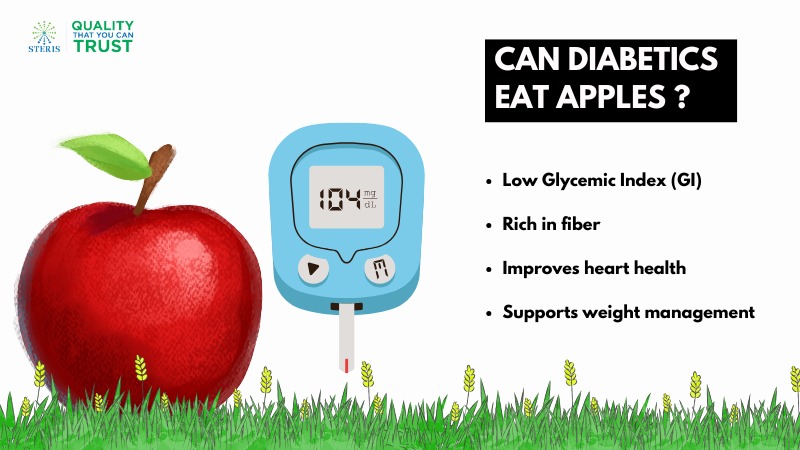Apples and Diabetes: Are They Really Safe? Benefits, Best Ways to Eat, and FAQs
Sep 08, 2025
Introduction
When it comes to managing diabetes, food choices play a crucial role. Fruits are often confusing—some people think they are “too sweet” to be safe. Among them, apples are one of the most debated. But are apples actually good for diabetes? Let’s dive deeper into their nutritional profile, benefits, and the right way to include them in a diabetic diet.
Nutritional Value of Apples
- Calories (medium apple): ~95 kcal
- Carbohydrates: ~25 g (includes natural sugars)
- Fiber: ~4 g
- Vitamin C, potassium, and antioxidants
What makes apples stand out is their fiber content—especially soluble fiber (pectin)—which slows down sugar absorption and keeps blood sugar levels stable.
Benefits of Apples for Diabetes Patients
- Low Glycemic Index (GI)
- Apples have a GI of 36–40, making them a low-GI fruit.
- This means they cause a gradual rise in blood sugar instead of sudden spikes.
- Rich in Fiber
- Fiber slows down digestion and sugar release.
- Helps improve satiety (keeps you full longer), reducing overeating.
- Improves Heart Health
- Diabetes increases heart risks, but apples provide potassium and antioxidants that support heart health.
- Supports Weight Management
- Apples are low in calories but filling, making them a healthy snack choice for weight control—important in diabetes management.
- Boosts Gut Health
- The pectin in apples acts as a prebiotic, improving digestion and gut health, which indirectly supports better blood sugar control.
- Reduces Risk of Complications
- Regular apple intake has been linked to lower risks of stroke, heart disease, and Type 2 diabetes progression.
Best Ways to Eat Apples if You Have Diabetes
Eat them whole with skin – most fiber and antioxidants are in the skin.
Choose fresh apples over juices (juices spike sugar quickly).
Pair apples with protein or healthy fats (like nuts, peanut butter, or yogurt) to further slow sugar release.
Opt for smaller portions (one medium apple or half a large apple at a time).
Prefer organic apples if possible to avoid pesticide residue.
Precautions
- Don’t overeat—even though apples are healthy, too many can raise blood sugar.
- Avoid packaged apple juice or sweetened dried apples.
- Monitor your sugar levels after eating apples to understand your body’s response.
Frequently Asked Questions (FAQs)
Q1. Can I eat apples daily if I have diabetes?
Yes! One medium apple a day is generally safe and even beneficial for most diabetic patients.
Q2. Which apple is best for diabetes—red or green?
Both are good, but green apples are slightly lower in sugar and higher in fiber, making them a better choice for strict sugar control.
Q3. Do apples raise blood sugar?
They do, but slowly—thanks to fiber and low GI. They are much safer compared to high-sugar fruits like mangoes or grapes.
Q4. Is apple juice good for diabetics?
No. Juices lack fiber and cause rapid sugar spikes. Always prefer whole apples.
Q5. Can apples help prevent diabetes complications?
Yes. Their antioxidants and nutrients support heart health, weight management, and overall wellness, reducing complications.
Conclusion
Apples are not only safe but also highly beneficial for people with diabetes—when eaten in moderation and the right way. They provide fiber, antioxidants, and essential nutrients that support stable blood sugar, heart health, and overall well-being.
At Steris Healthcare Pvt. Ltd., we believe in combining the power of modern medicines with healthy lifestyle and nutrition choices. While our wide range of affordable medicines supports diabetes management, simple dietary habits like eating apples can make your health journey smoother and more balanced.
Recent Post

What Is Magnesium Glycine Complex & How Does It Work with Vitamin D3?

Best Activated Charcoal Soap for Daily Skin Detox – EUROSOFT ACTIVE COAL

Why Calcium Citrate Maleate with K2-7 & Magnesium Bisglycinate Is Superior for Osteoporosis

EUROSOFT 4D Skin Cream for Clear, Healthy-Looking Skin

Steris Healthcare ELIGOLUX – Effective Solution for Endometriosis Pain Management

What is the Olmesartan, Cilnidipine, and Chlorthalidone Combination Pill For?

How Multivitamin, Multimineral and Amino Acid Tablets with Taurine & Ginseng Support Active Lifestyles

Cinacalcet Tablets 60 mg: When They’re Used and What to Expect

What to Expect When Taking Opipramol 100 mg: A First-Timer’s Guide

How Do Empagliflozin, Linagliptin, and Metformin ER Work Together for Diabetes Control?

